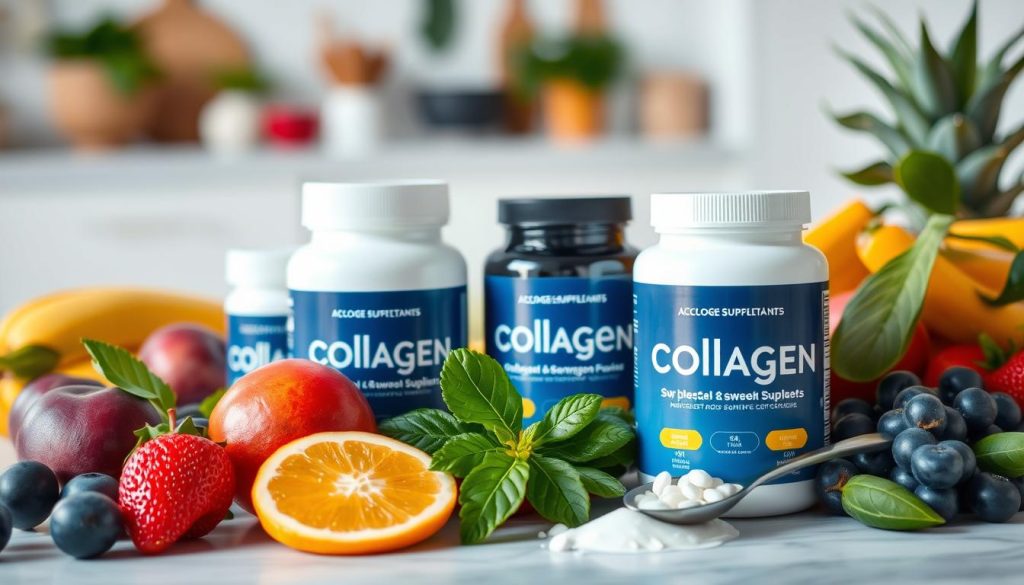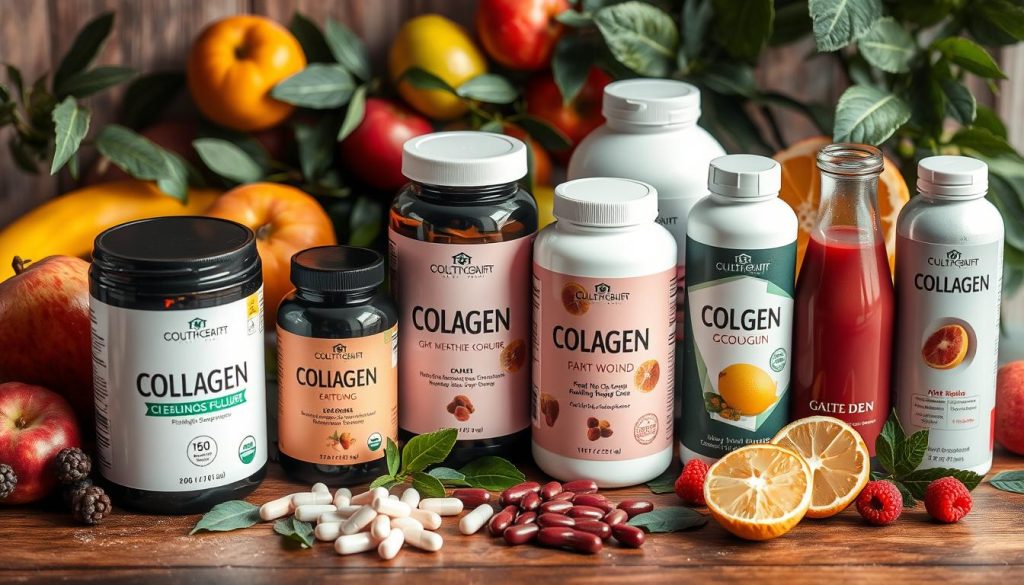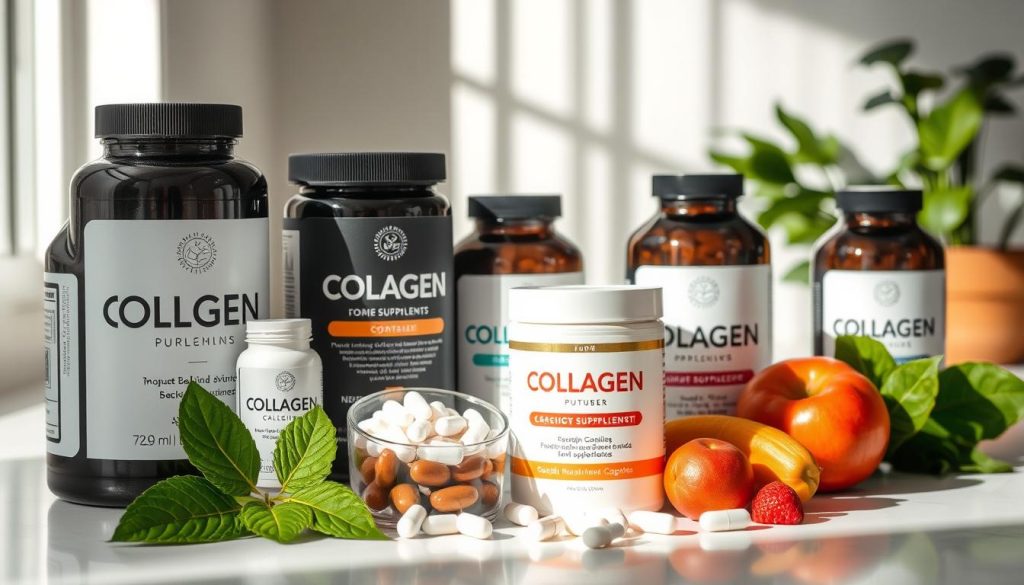Did you know that collagen makes up a remarkable 30% of the body’s total protein1? This shows how important collagen is for our health. Collagen supplements are popular for their benefits to skin, hair, nails, joints, muscles, and bones. It’s key to know the right daily amount for your needs. This guide will help you find the best collagen dosage for you.

The daily collagen dose is usually between 2.5 grams and 15 grams, with 8 grams being a common choice1. The National Library of Medicine recommends up to 10 grams a day1. Some people can handle up to 20 grams, but experts agree on a maximum of 15 grams1.
Key Takeaways:
- Collagen makes up 30% of the body’s total protein1.
- The recommended daily collagen intake ranges from 2.5 to 15 grams1.
- The National Library of Medicine suggests up to 10 grams of collagen per day1.
- Some individuals may tolerate up to 20 grams of daily collagen, but the consensus is a maximum of 15 grams1.
- Collagen supplements are not suitable for vegans, vegetarians, individuals with fish allergies, pregnant and breastfeeding women1.
Understanding Collagen and Its Role in the Body
Collagen is the most common protein in our bodies, making up about 30% of our total protein2. It’s crucial for keeping our skin, bones, muscles, tendons, and other tissues healthy3.
What Makes Collagen Essential
Collagen is special because it’s strong and flexible. It keeps our skin looking good and our joints moving smoothly3. As we get older, our bodies make less collagen. That’s why many people take collagen supplements to stay healthy2.
Natural Sources of Collagen
We can get collagen from our food, like poultry, fish, and bone broth3. Fruits and veggies, like citrus fruits and leafy greens, also help our bodies make collagen3.
The Science Behind Collagen Production
Making collagen in our bodies is a complex process2. It involves many steps, from making amino acids to forming collagen fibrils2. Our age, diet, and lifestyle can affect how much collagen we make. So, eating right and staying healthy is key for good collagen levels2.

“Collagen is the most abundant protein in the body, accounting for 30% of total protein content. It supports skin, bones, muscles, ligaments, and other connective tissues.”
Different Types of Collagen Supplements Available
Collagen supplements come in many forms, each with its own benefits. Hydrolyzed collagen is the most common and easily absorbed type. It’s found in capsules or powders4. This form is broken down into smaller peptides, making it easier for the body to use4.
Marine collagen comes from wild-caught cod and is a type 1 collagen. It’s great for skin health because it’s similar to human skin collagen4.
Some supplements also have hyaluronic acid and vitamins. These extra ingredients help improve joint health, skin elasticity, and overall well-being4.
| Collagen Type | Key Benefits | Common Sources |
|---|---|---|
| Type I Collagen | Supports skin, hair, nails, and bone health | Bovine, marine, and egg sources |
| Type II Collagen | Promotes joint and cartilage health | Chicken and eggshell membrane |
| Type III Collagen | Maintains healthy blood vessels and organs | Bovine and marine sources |
It’s crucial to pick a high-quality collagen supplement. Look for one that’s third-party tested for purity and potency5. This ensures you get a safe and effective product for your health5.

When choosing a collagen supplement, think about your health goals. Consider the type of collagen that fits your needs best. With so many options, you can find the right supplement to boost your collagen peptides dosage, support hydrolyzed collagen intake, and enjoy the benefits of marine collagen45.
“Collagen supplements have become increasingly popular in recent years as people seek natural ways to support their skin, joints, and overall health.”
Knowing about the different collagen supplements and their benefits helps you make a smart choice. This way, you can optimize your daily collagen peptides dosage and reach your health and wellness goals45.
How Much Collagen Should You Take per Day?
The right amount of collagen depends on your age, gender, and health goals. Studies show that 2.5 to 15 grams daily is safe and effective6. Older adults might need more because their bodies make less collagen as they age7. Women might need different amounts than men, especially during menopause7.
Factors Affecting Daily Dosage
Many things can change how much collagen you need. These include your age, gender, health, and the type of collagen supplement7. Start with a small dose and slowly increase it to see what works best for you7.
Age-Specific Recommendations
As we get older, our collagen levels drop, causing wrinkles and joint pain7. Older adults might need 5 to 15 grams of collagen daily to help with skin, bones, and joints7.
Gender-Based Dosage Guidelines
Women and men might need different amounts of collagen, especially at certain times in life. Women might need more during menopause to keep their skin and bones healthy7. Men might benefit from more to help with muscle and performance7.
| Gender | Recommended Daily Dosage |
|---|---|
| Women | 2.5 to 10 grams |
| Men | 5 to 15 grams |
Keep in mind, these are just general suggestions. Your specific needs and goals might require a different amount. Always talk to a healthcare professional before starting any new supplement7.
Benefits of Taking the Right Collagen Dosage
Adding the right amount of collagen supplements to your day can greatly improve your health. Collagen powder benefits include better skin, fewer wrinkles, stronger nails, and healthier hair.
Research shows that collagen supplements can make your skin more hydrated8. They can also help strengthen bones in women after menopause8 and ease osteoarthritis symptoms8. You’ll start to see these benefits after about 90 days.
About 90% of our collagen is type 1, found in our skin, tendons, organs, bones, hair, and nails9. Our body starts making less collagen around age 259. This is why taking supplements is key to keeping our skin, nails, and hair looking young as we get older.
Collagen is also great for recovery after working out and for fitness9. A lot of our muscle is made of collagen, which is vital for athletes9. Taking 15-20 grams of collagen daily, along with exercise and vitamin C, can help build muscle, improve body shape, and boost sports performance9.
Whether you want to enhance your skin, joints, or athletic abilities, the right collagen dosage can help. Should you take collagen supplements? Absolutely, if you find the right amount for your needs.
Best Times to Take Collagen Supplements
There’s no single best time to take collagen supplements. Yet, studies hint at some benefits for certain times10.
Morning vs. Evening Consumption
Many take collagen in the morning, mixing it into smoothies or coffee. This might help it absorb faster since you’re not eating11. Others prefer taking it before bed for better sleep and brain function12.
With or Without Food
You can take collagen with or without food. Some research shows it works better with meals that have other proteins11. Taking it on an empty stomach might let it absorb quicker11.
Optimal Absorption Tips
To get the most out of collagen supplements, follow these tips:
- Drink it with cold water, as heat can lower its effectiveness11.
- Combine it with foods or supplements high in vitamin C to boost collagen production12.
- Split your daily dose into smaller servings, especially if you eat a lot of protein10.
- Stick to a regular routine of high-quality collagen supplements for the best results10.
Choosing the best time for collagen supplements is personal. Try different times and ways to see what suits you best11.
Safe Upper Limits and Potential Risks
Collagen supplements are usually safe, but too much can cause side effects13. The safe limit is about 15 grams a day. Some people might handle more, but it’s not always the case13. If you’re allergic to fish, stay away from marine collagen supplements13.
Women who are pregnant or breastfeeding, or those with certain health issues, should talk to a doctor first13. Too much collagen might upset your stomach, cause bloating, or lead to diarrhea13.
To stay safe, always follow the dosage advice from the supplement maker or a doctor14. Your age, gender, and health play a big role in how much collagen you should take14.
| Potential Side Effects of Excessive Collagen Intake | Suggested Safe Dosage Range |
|---|---|
| – Digestive discomfort – Bloating – Diarrhea |
– 2.5 to 15 grams per day for skin and bone health – 10 to 40 mg per day for joint health (undenatured collagen) |
Knowing the safe limits and risks helps you choose the right amount of collagen131415.
“Collagen supplements have a good safety profile and are not associated with adverse side effects.”
How to Choose Quality Collagen Supplements
When picking a collagen supplement, look for hydrolyzed collagen for better absorption. Key ingredients like vitamin C can also enhance collagen synthesis16. Also, choose products that have been tested by third parties and have quality and purity certifications.
The source of the collagen matters too. You can find collagen supplements from cows, seafood, or poultry16. Pick the one that fits your diet and any allergies you might have.
Key Ingredients to Look For
- Hydrolyzed collagen or collagen peptides for improved absorption16
- Vitamin C to support natural collagen production16
- Biotin, zinc, and copper to further enhance collagen benefits
Third-Party Testing and Certifications
Make sure to choose collagen supplements that have been tested by third parties16. This ensures they are clean and contain what they say they do. Look for certifications from USP, NSF, or ConsumerLabs.
Choosing a top-notch collagen supplement can offer many benefits. Focus on the right ingredients, source, and third-party checks. This way, you’ll find a product that supports your health and wellness.
Combining Collagen with Other Supplements
Getting the most out of collagen supplements can be done by mixing them with other good nutrients. Vitamin C is key for making collagen, and research shows it boosts collagen’s power when taken together17. Hyaluronic acid, often paired with collagen, also helps with skin and joint health.
When picking a collagen supplement, find one with extras like vitamin C, magnesium, calcium, and probiotics. These can help your body make more collagen and stay healthy17. But, be careful of collagen supplements with synthetic vitamins and minerals. They might not work as well and could even harm your health17.
Talking to a healthcare expert can guide you to the best mix of supplements for you. By carefully choosing what to pair with collagen, you can improve your health and feel better overall.
“Collagen supplements with added vitamins and minerals may provide more benefits, but it’s crucial to choose high-quality formulations to ensure the safety and efficacy of the combined ingredients.”
Signs You’re Taking the Right Amount
Wondering if you’re getting the right amount of collagen from supplements? There are clear signs to look out for16. Studies show that taking 2.5 grams to 10 grams of collagen daily is safe2. By 40, we lose about 1% of our collagen each year, so supplements can help slow this down.
Improved skin elasticity is a key sign you’re on the right path2. Collagen supplements can help keep your skin looking young and healthy. You might also feel less joint pain2, thanks to collagen’s benefits for osteoarthritis. Stronger nails and healthier hair are other signs you’re getting enough collagen2.
These benefits usually show up after 90 days of taking collagen supplements3. For skin and hair, you might see improvements in 8-12 weeks. For arthritis, it could take about 5 months3. If you’re not seeing results, you might need to adjust your dosage or try a different type of collagen3.
Remember, always talk to a healthcare provider before changing your supplements2. They can guide you on the best collagen dosage and type for your needs and goals.
In summary, if you see improvements in your skin, joints, nails, and hair, you’re likely on the right track. But remember, the right dosage and type of collagen can vary for each person3. There’s no one-size-fits-all daily collagen intake, but research suggests 2.5-10 grams daily for general health benefits3.
Conclusion
Finding the right optimal collagen consumption is key to getting the most out of it. The daily intake can range from 2.5 to 15 grams, but it depends on your personal needs18. Think about your age, gender, and health goals when choosing your optimal collagen dosage18.
Quality, consistency, and timing are important for the best results from collagen supplementation19. Always pick high-quality products. Also, talk to a healthcare professional to make your collagen supplement guide fit your needs.
Collagen makes up about 30% of the proteins in our bodies18. Young people might need 5-10 grams of collagen daily. But, those over 40 might need 10-20 grams because collagen breaks down faster18.
The most you should take is 20 grams of collagen a day. Start with 5 grams and slowly increase it18. Taking collagen in two or three doses a day can help it absorb better18.
Collagen supplements are safe and can help with many health issues19. For best results, take collagen for at least 3-4 months18. By following your collagen supplement guide and using quality products, you can improve your health and wellness.